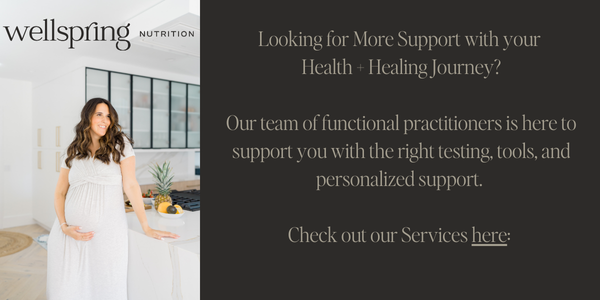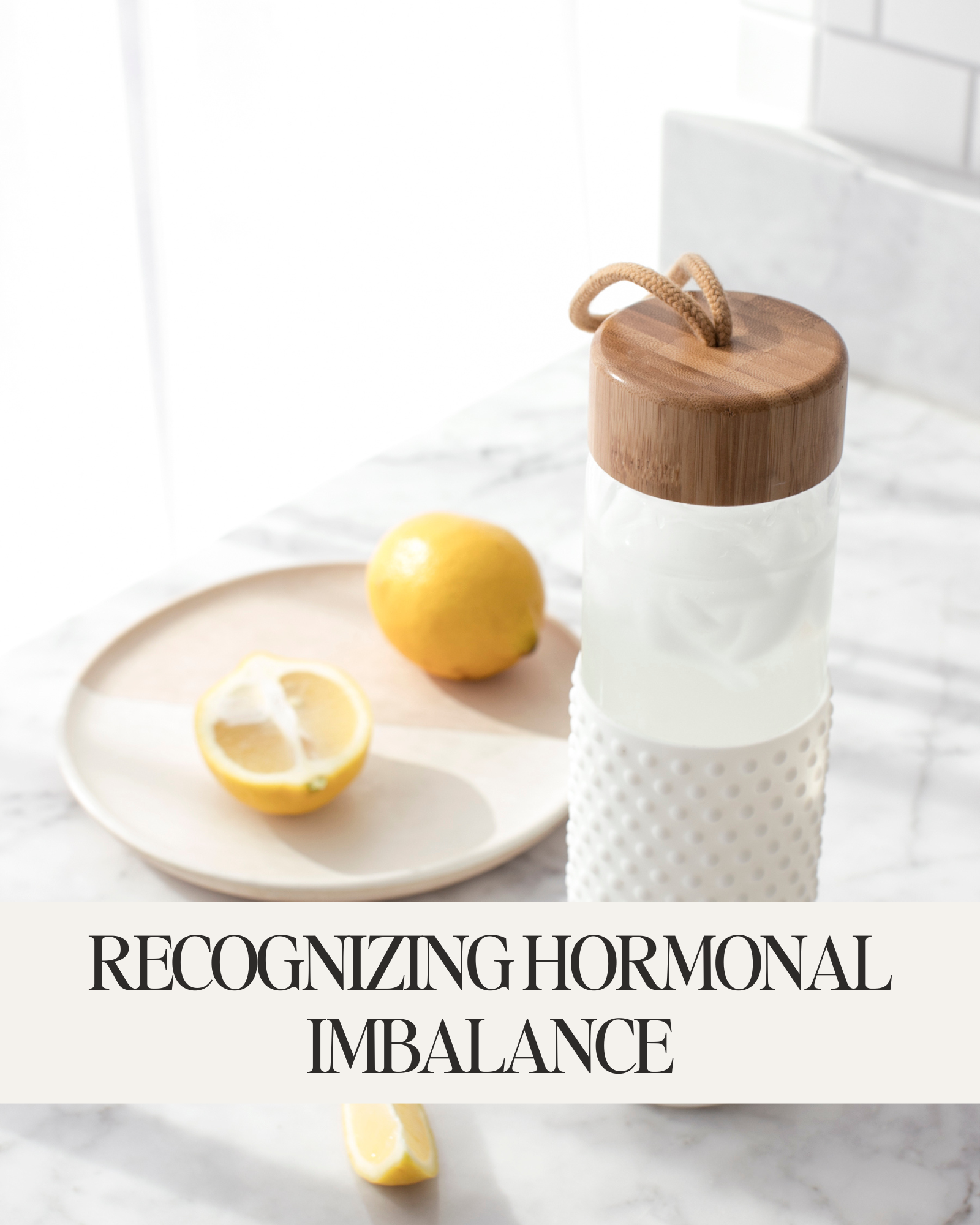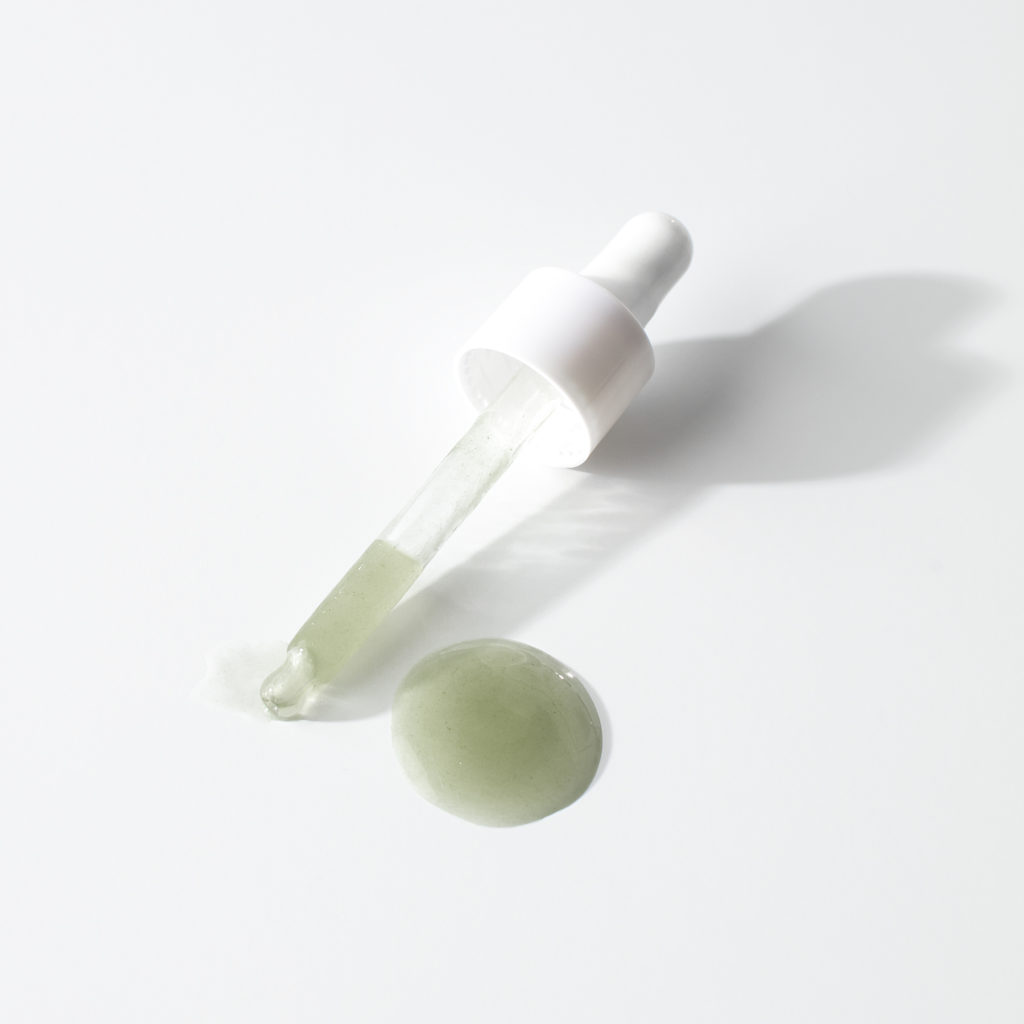Non-Toxic Living
Resources
Style
Planning
View All
Written by: Lauren Chamberlain
Edited and Reviewed By: Anabelle Clebaner MS, RDN
Fertility is often thought of as a fixed trait, something predetermined by genetics. However, research in the field of epigenetics is revealing a different reality—one where lifestyle choices, environment, and nutrition can directly influence fertility and even impact the health of future generations. Epigenetics refers to modifications in gene expression that don’t alter DNA itself but affect how genes function. These changes can be passed down, meaning the way we live today has lasting consequences beyond just our own reproductive health.
Recent studies have shown that dietary patterns, stress levels, and environmental exposures can trigger epigenetic modifications that affect reproductive health. These findings highlight how fertility isn’t just about genetics—it’s also about how we live our daily lives.
So, what does this mean for fertility? Simply put, the way we eat, manage stress, exercise, and even sleep can influence our ability to conceive and the long-term health of our children. Let’s explore how epigenetics shapes fertility and what lifestyle changes can make a positive impact.
What is Epigenetics?
Epigenetics is the study of how external factors can turn genes on or off without altering the DNA sequence itself. This occurs through mechanisms like:
- DNA Methylation – Chemical tags attach to DNA, affecting gene expression. This process helps regulate hormone production and embryo development. Too much or too little methylation can disrupt fertility-related genes, impacting egg and sperm quality
- Histone Modification – DNA wraps around proteins called histones; changes in this structure can enhance or suppress gene activity, influencing reproductive potential. Studies suggest that histone modifications play a key role in gametogenesis and early embryo development.
- Non-Coding RNA – These molecules help regulate gene function, ensuring that reproductive processes occur smoothly. Specific microRNAs (miRNAs) have been linked to follicular development and sperm maturation.
In fertility, epigenetics plays a crucial role in egg and sperm quality, embryo development, and hormone regulation. Small lifestyle adjustments can either support or hinder these processes, influencing both conception and pregnancy outcomes.
The Link Between Epigenetics and Fertility
Epigenetic changes affect both male and female fertility in various ways, including:
- Egg and Sperm Quality: Poor nutrition, stress, and toxins can trigger harmful epigenetic modifications, reducing reproductive potential. Oxidative stress can impair mitochondrial function in oocytes, impacting fertilization and embryo viability.
- Hormone Balance: The way genes regulate estrogen, progesterone, and testosterone is influenced by lifestyle, affecting ovulation and sperm production.
- Reproductive Disorders: Conditions like PCOS, endometriosis, and unexplained infertility are linked to epigenetic shifts. Recent studies suggest that altered DNA methylation patterns in endometrial tissue contribute to implantation failure.
By understanding these connections, we can take proactive steps to support fertility through daily habits.
Lifestyle Factors That Influence Epigenetics and Fertility
1. Nutrition: Fueling Fertility at the Genetic Level
A diet rich in essential nutrients directly influences epigenetic programming. Key nutrients include:
- Folate & B Vitamins – Support proper DNA methylation, essential for healthy egg and sperm development.
- Vitamin D – Enhances ovulation and facilitates egg transport and fertilization in the oviduct.
- Choline – Plays a role in fetal brain development and gene expression.
- Antioxidants (Vitamin C, E, Selenium, Zinc) – Reduce oxidative stress, protecting reproductive cells.
- Healthy Fats (Omega-3s) – Essential for hormone production and epigenetic signaling.
- Coenzyme Q10 (CoQ10) – Supports mitochondrial function and enhances egg and sperm quality, playing a role in energy production within reproductive cells
In contrast, processed foods, refined sugars, and trans fats can disrupt hormonal balance and negatively influence gene expression.
2. Stress and Cortisol: The Hidden Fertility Disruptor
Chronic stress triggers the HPA-axis (hypothalamic-pituitary-adrenal axis), a system responsible for regulating stress hormones. When overstimulated, the HPA-axis increases cortisol levels, negatively impacting ovulation, implantation, and sperm production. Epigenetic research suggests that prolonged stress can alter hormone receptor genes, making the body less responsive to reproductive hormones.
Ways to manage stress:
- Mindfulness & Meditation – Helps lower cortisol and supports reproductive hormone balance.
- Regular Movement – Gentle exercise like walking, yoga, or strength training improves resilience.
- Adaptogens – Herbs like ashwagandha and rhodiola may support adrenal health.
- Adequate Sleep – Poor sleep raises cortisol and disrupts hormone production.
3. Environmental Exposures: The Silent Epigenetic Disruptors
Everyday exposure to toxins and endocrine-disrupting chemicals (EDCs) can negatively impact fertility by altering gene expression. Common culprits include:
- Plastics (BPA, phthalates) – Found in food containers, disrupt hormonal balance.
- Pesticides & Heavy Metals – Linked to poor sperm quality and egg development.
- Personal Care Products (Fragrances, Parabens) – Interfere with estrogen and progesterone function.
Ways to reduce exposure:
- Choose organic produce when possible.
- Use glass or stainless-steel containers instead of plastic.
- Switch to non-toxic beauty and cleaning products.
- Minimize use of single-use coffee pods, as they may contain BPA and phthalates that disrupt hormone function!
4. Exercise: Finding the Right Balance
Physical activity supports healthy gene expression and improves fertility by:
- Regulating insulin and blood sugar (critical for PCOS and hormone balance).
- Enhancing circulation to reproductive organs.
- Lowering inflammation, which can affect egg and sperm quality.
However, excessive exercise can have the opposite effect, triggering stress responses that suppress ovulation and lower sperm count. Finding a balance with moderate movement is key.
5. Sleep and Circadian Rhythm: The Overlooked Fertility Factor
Melatonin, the sleep hormone, also plays a significant role in fertility by regulating the menstrual cycle and protecting eggs and sperm from oxidative stress. Poor sleep patterns can lead to:
- Disrupted reproductive hormones (irregular ovulation and sperm production).
- Increased inflammation and stress levels.
- Higher risk of pregnancy complications.
Improving sleep hygiene can enhance fertility by supporting natural hormone rhythms.
Transgenerational Effects: How Your Choices Affect Future Generations
Perhaps the most fascinating aspect of epigenetics is that lifestyle habits not only impact your fertility but also your children and grandchildren. Studies suggest:
- Parental diet before conception can shape a child’s metabolism and disease risk.
- Stress during pregnancy can alter fetal gene expression, affecting health later in life.
- Environmental exposures in one generation may increase infertility risks in future ones.
This means that the steps taken today to optimize fertility aren’t just for us—they’re for future generations, too.
Practical Steps to Optimize Epigenetics for Fertility
To support fertility and healthy gene expression, consider:
- Eating a nutrient-dense diet rich in whole foods and antioxidants.
- Managing stress with meditation, journaling, or therapy.
- Reducing exposure to environmental toxins.
- Finding a balanced exercise routine.
- Prioritizing sleep and circadian rhythm alignment.
Even small changes—like switching to glass food storage, adding more omega-3s to your diet, or prioritizing sleep—can positively impact your fertility and future generations. Which one will you start with today?
Try the Modified Mediterranean Diet
Studies have found that low homocysteine levels were found in those that followed this diet. Remember – elevated homocysteine levels are linked to poor egg quality and deficiencies in folate and B12. The traditional Mediterranean Diet is high in grains.
Try this version instead:
- Less grains, more starchy veggies and berries, low glycemic load carbs
- Healthy fats like olive oil, avocados, nuts, seeds, and animal fats from pasture raised, grass fed animals
- Full- fat dairy (preferably raw or fermented dairy)
Unlike the traditional Mediterranean diet, this version limits grains to stabilize blood sugar and support hormone balance. The inclusion of pasture-raised animal fats and full-fat dairy ensures an optimal intake of fat-soluble vitamins (A, D, E, K), choline, and glycine, all critical for reproductive health. This diet is also rich in B vitamins, omega 3 fatty acids, choline, iron, and zinc! All powerhouse nutrients that promote reproductive health.
Conclusion
Epigenetics is transforming our understanding of fertility, showing us that our daily choices influence not only our ability to conceive but also the long-term health of our offspring. By adopting healthy nutrition, stress management, toxin reduction, and sleep habits, we can optimize fertility in a way that extends far beyond our own generation.
Making these changes today isn’t just about getting pregnant—it’s about creating a healthier future for generations to come.

Sources
https://pmc.ncbi.nlm.nih.gov/articles/PMC6463256

Understanding Hormonal Imbalance
Hormones, integral to myriad bodily functions, act as chemical messengers sent through the bloodstream to tissues and organs. Manufactured by various glands in the endocrine system, these potent chemicals influence everything from growth and metabolism to mood and reproductive health. A delicate balance is crucial for maintaining overall well-being.
When this balance is disrupted—whether due to natural life stages, such as puberty, pregnancy, or menopause, or other factors—your body can experience a range of symptoms. From unexplained weight fluctuations to mood swings, these changes are often indicators that your body’s hormonal equilibrium is off-kilter.
It’s important to recognize these signs early and understand the underlying causes. Hormonal imbalances aren’t just about feeling “out of sorts”; they can significantly impact your long-term health. By being vigilant and proactive, you can work with healthcare providers to address these imbalances, often through lifestyle adjustments, dietary changes, or medical interventions.
Identifying Hormonal Imbalance: What to Look For

Hormonal imbalances can manifest in various ways, often making it challenging to pinpoint the exact cause. Nevertheless, being aware of the common signs can help you recognize potential issues early. One of the primary indicators of a hormonal imbalance is unexplained weight changes. If you find yourself gaining or losing weight without any significant changes to your diet or exercise routine, it might be worth considering if your hormones are playing a role.
Another telltale sign is persistent fatigue. While feeling tired after a long day is normal, constant exhaustion that doesn’t improve with rest could be a red flag. Hormones like cortisol and thyroid hormones significantly influence your energy levels, so imbalances here can leave you feeling drained.
Mood swings and mental health symptoms are also common among those experiencing hormonal imbalances. If you notice sudden shifts in your mood, increased anxiety, or episodes of depression, these might be linked to hormonal fluctuations. Women often report these symptoms during menstrual cycles, pregnancy, and menopause due to changing estrogen and progesterone levels.
Irregular menstrual cycles are another significant indicator. Skipped periods, extremely heavy or irregular cycles, and severe PMS can all point to an imbalance in reproductive hormones such as estrogen and progesterone. Additionally, changes in your skin and hair, like unexpected acne, dry skin, or unusual hair loss, can signify hormonal issues.
Digestive problems like bloating and changes in bowel movements are less commonly known but equally important signs. Hormones such as estrogen and cortisol can impact your digestive health, leading to discomfort and irregularities.
It’s crucial to consult a healthcare professional if you suspect a hormonal imbalance. They can provide appropriate tests and evaluations to get to the root of the problem, ensuring you receive the correct treatment and management strategies.
Common Symptoms of Hormonal Imbalance
Hormonal imbalances can manifest in a variety of ways, often making them challenging to pinpoint. However, certain symptoms are particularly indicative of this issue. Here are some of the most common signs to be aware of:
- Fatigue: Feeling unusually tired despite getting enough sleep can be a red flag. Hormones like cortisol and thyroid hormones play a key role in regulating your energy levels.
- Weight Gain: Unexplained weight gain or difficulty losing weight, especially around the abdomen, is often linked to hormonal imbalances.
- Mood Swings and Depression: Emotional fluctuations or persistent low mood can arise due to imbalances in hormones like estrogen, progesterone, and thyroid hormones.
- Acne: Sudden or severe acne outbreaks, especially in adulthood, can be a sign that your hormones are off balance.
- Digestive Issues: Symptoms such as bloating, diarrhea, or constipation can be tied to an imbalance in hormones that govern digestion.
- Hair Loss: Thinning hair or bald patches can indicate issues with hormones like androgens or thyroid hormones.
- Irregular Sleep Patterns: Struggling with sleep, whether it’s difficulty falling asleep or staying asleep, can be influenced by hormones like melatonin and cortisol.
- Irregular Periods: For women, changes in menstrual cycles, heavy bleeding, or missed periods are often clear signs of hormonal imbalance.
- Night Sweats and Hot Flashes: These are common during perimenopause and menopause but can also signify other hormonal issues.

Recognizing these symptoms early can be crucial for addressing hormonal imbalances effectively. If you experience any of these signs persistently, consulting with a healthcare provider can help you get back on track.
Hormonal Imbalance: Causes and Risk Factors
Hormonal imbalances can strike at any stage in life and are frequently linked to natural hormonal shifts. For instance, puberty, pregnancy, and menopause are notable life stages when hormonal changes are almost inevitable. However, they aren’t the sole culprits. Other causes span a wide range, including chronic stress, autoimmune conditions, injuries to endocrine glands, and the effects of steroids or certain medications.
Chronic stress is a major player in disrupting hormonal equilibrium. When you’re stressed, your body releases cortisol, the stress hormone, which can interfere with the production of other hormones, leading to an imbalance. Certain medications, including steroids and birth control pills, can also have unintended side effects on your hormonal health.
Autoimmune conditions, such as Addison’s disease and thyroid disorders, directly affect hormone-producing glands, making them a significant risk factor. For example, in hypothyroidism, the thyroid gland doesn’t produce enough hormones, leading to various symptoms like fatigue, weight gain, and depression.
Injury or trauma to endocrine glands is another less common but severe cause. These glands, including the pituitary, adrenal, and thyroid glands, are crucial for hormone production. Damage to any of these can result in significant hormonal imbalances.
Lastly, non-physiological factors such as lifestyle choices and environmental exposures also play a role. Poor diet, lack of exercise, significant weight fluctuations, and even exposure to certain chemicals can all impact hormonal levels.
Understanding these causes and risk factors is the first step towards identifying and managing hormonal imbalances. Being aware of what might be affecting your hormones can help you make more informed health choices, bringing you one step closer to balance.
Digestive Problems Linked to Hormonal Imbalance
Hormonal imbalances can affect various bodily functions, and your digestive system is no exception. If you’ve been experiencing persistent digestive issues, such as constipation or diarrhea, it might be time to consider whether your hormones are to blame. But how exactly are these two connected?
Hormones like estrogen and progesterone play significant roles in regulating your gut function. For instance, fluctuations in estrogen levels can slow down or speed up your digestive tract, leading to symptoms like bloating, gas, or changes in stool consistency. Similarly, imbalances in thyroid hormones can also lead to gastrointestinal discomfort, manifesting as either constipation or diarrhea.
Recent research has even suggested a link between hormonal imbalances and irritable bowel syndrome (IBS), especially in people assigned female at birth (AFAB). This connection further underscores the importance of considering hormonal health when diagnosing chronic digestive problems.
If you’re noticing a pattern between your digestive symptoms and phases of your menstrual cycle, stress levels, or weight changes, it may point to a hormonal imbalance. By identifying and addressing these issues, you can take significant steps to improve your digestive health.
Hair Loss and Hormonal Changes
Hair loss can be a distressing experience, and hormones often play a significant role in this issue. Changes in hormone levels, particularly androgens, can trigger hair thinning or significant hair loss. This is especially common during life stages such as menopause, pregnancy, or periods of high stress, where hormonal fluctuations are prominent.
For women, menopause-related hormonal changes can lead to a decrease in estrogen and progesterone levels. These hormones are essential in maintaining hair growth and health. When their levels drop, hair may become thinner, and some women might experience noticeable hair shedding.
On the other hand, an overproduction of androgens, often seen in conditions like polycystic ovary syndrome (PCOS), can lead to hair thinning and even male-pattern baldness in women. It’s not just about losing hair; hormonal imbalances can also cause excessive hair growth in unwanted areas, a condition known as hirsutism.
Identifying hormonal hair loss involves being aware of other associated symptoms of hormonal imbalance, such as menstrual irregularities, weight gain, and skin changes. If you’re noticing changes in your hair alongside these symptoms, it might be time to consult with a healthcare professional for a thorough evaluation.
Understanding the root cause of hormonal hair loss is the first step towards finding an effective treatment plan, which may include lifestyle changes, medication, or various natural remedies designed to rebalance your hormone levels.
Natural Ways to Balance Your Hormones
Seeking natural ways to balance your hormones? You’re not alone. Many individuals turn to holistic and lifestyle approaches before opting for medical intervention. Here’s a guide to help you get started on your journey to hormonal harmony.
Nutrition and Dietary Choices
What you eat plays a vital role in hormone regulation. Prioritize whole, unprocessed foods, and aim for a balanced diet rich in:
- Fiber: Found in fruits, vegetables, and whole grains, fiber aids in detoxifying the body and maintaining steady blood sugar levels.
- Healthy fats: Include sources like avocados, olive oil, and fatty fish. These fats are essential for hormone production.
- Proteins: Lean proteins such as chicken, fish, and plant-based options like beans and lentils provide necessary building blocks for hormone synthesis.
Regular Exercise
Consistent physical activity is a powerhouse for balancing hormones. Not only does it help in maintaining a healthy weight, but it also reduces stress—a common cause of hormonal imbalances. Aim for a mix of aerobic exercises, strength training, and relaxing activities like yoga or tai chi. Remember, consistency is key!
Stress Management
Chronic stress can wreak havoc on your hormones, leading to issues like adrenal fatigue and thyroid disorders. Incorporating stress-reducing practices such as meditation, deep-breathing exercises, or even hobbies you enjoy can foster a more balanced hormonal environment.
Adequate Sleep
Quality sleep is non-negotiable for hormonal health. Aim for 7-9 hours of restful sleep per night. This will aid in the regulation of cortisol levels and ensure your body has time to repair and produce hormones.
Limit Toxins and Endocrine Disruptors
Exposure to toxins found in some household cleaners, plastics, and even cosmetics can affect your hormonal balance. Opt for natural cleaning products, avoid plastic containers, and choose organic produce when possible to reduce exposure to harmful chemicals.
Hydration
Staying adequately hydrated is often overlooked but is crucial for hormone transport throughout the body. Aim for at least 8 glasses of water a day, and consider herbal teas like chamomile or green tea, which offer additional antioxidant benefits.
Balancing your hormones naturally involves a holistic approach. By incorporating these lifestyle changes, you can start to feel more balanced and in control of your hormone health. Remember, it’s about consistency and creating habits that support your overall well-being.
Hormone Testing: What You Need to Know
When it comes to diagnosing hormonal imbalances, pinpointing the exact issue can often feel like solving a mystery. Doctors typically begin by documenting your specific symptoms and health history. This preliminary information is critical; it guides what types of hormone tests might be necessary.
Blood tests are a common method for measuring hormone levels. These tests can detect hormones circulating in the bloodstream, providing essential data about what’s going on internally. Hormones such as estrogen, testosterone, cortisol, and thyroid hormones are often part of this testing process.
While blood tests are a primary tool, they aren’t the only option. At-home tests have become increasingly popular, providing convenience and privacy. These tests may involve saliva, blood, or urine samples. However, it’s essential to follow up any at-home test results with your healthcare provider to ensure accuracy and appropriate treatment.
For women, timing can be crucial in hormone testing. Specific hormone levels fluctuate throughout the menstrual cycle. Therefore, your doctor may recommend testing on particular days to get the most accurate readings. This is particularly relevant for hormones like progesterone and estrogen.
Utilizing functional testing such as the DUTCH hormone test, GIMAP stool test, and HTMA hair mineral test are just some of the tests you can utilize to get more answers around your hormone health. In our practice, we use all of these tests and more to help you uncover the root cause of your hormone and fertility challenges.
If you’d like more support with your hormone health, book a strategy call right here.
Throughout this article, we’ve explored the intricacies of hormonal imbalances, addressing their causes, symptoms, and natural remedies. By understanding the root factors and signs of hormonal disorders, you can take proactive steps towards managing your health more effectively. Recognizing digestive issues, hair loss, or sudden mood changes can be critical indicators to seek professional advice.
In conclusion, maintaining balanced hormones is key to overall well-being. It’s important to listen to your body and identify any unusual symptoms early. With proper dietary choices, regular exercise, stress management, and adequate sleep, you can naturally support your hormonal health. Remember, professional guidance is invaluable – don’t hesitate to reach out to healthcare experts to help navigate your hormonal health journey.

If you’re currently trying to conceive, you may have seen information around the internet about prioritizing non-toxic skincare and products – why?
What Are EDC’s?

The reason for prioritizing non-toxic products for fertility is to reduce the number of chemicals and endocrine disrupters you’re using on your body, which can impact your hormone health and reproductive health.
Some known endocrine disrupting hormones are:
- Pesticides – like glyphosate
- Phthalates – found in so many skincare products
- PCBs and Dioxins
- BPA Plastic
- Chemical retardants
- Perfluorochemicals found in clothes
Honestly, it can get very overwhelming pretty quickly when you start to think about the sheer volume of chemicals found in our skincare, makeup, cleaning products (even baby products!!)
Below I wanted to share some of my favorite non-toxic skincare brands to help you see that there are so many amazing companies producing clean products that won’t mess with your hormones or impact your chances of conceiving.
My Favorite Non-Toxic Brands for Fertility
- Tata Harper – I love their face masks and toners
- Ilia – beautiful bronzers and highlighters
- Kosas – pretty much all my makeup is from this brand. Super high quality
- Follain – I used to work for this company and learned soo much about clean beauty. Awesome resources and beautiful products.
- Credo – they have stores across the US and they carry so many different brands. One of my favorite stores to visit when I’m in NYC, Boston, or San Francisco.
- Primally Pure – their deodorant is amazing!

There you have it! I know there are so many more amazing brands out there, so if there’s one you know and love, let me know in the comments or DM on Instagram!
Looking for More Support?
We cover environmental toxins in DEPTH inside of my program – Nourishing Fertility. To learn more and snag $100 off the course, check out our FREE masterclass here.

The Preconception Playbook
This free playbook provides specific actionable tips to get started on your fertility journey, as well as what to avoid while you're trying to conceive.
Get the free playbook
